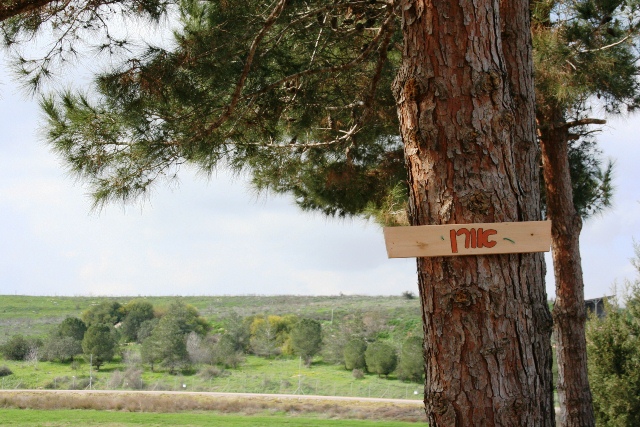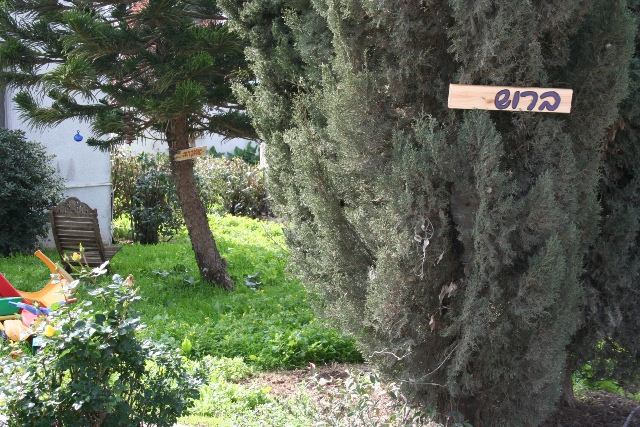As I was getting my kids into the bath last night, I heard a helicopter fly by close over our house. And I didn’t jump or startle.
I must be getting used to Israel.
When we first moved here, I jumped at every little sound: Not just the military helicopters flying by, but any loud booming noise; of which there are many in rural Northern Israel. Sometimes the sound comes from a digger breaking ground on a new lot; sometimes it’s an invisible jet soaring by, leaving a sonic boom in its wake and shaking the windows “The Right Stuff” style. Sometimes it’s just a tractor trailer driving by on its way to deliver petrol or chickens.
When we first moved here, I did a lot of pretending. Pretending like I didn’t worry about terrorist attacks or war. It wasn’t strategic or intentional pretending, mind you, and I was never actively scared to live here. It was the kind of pretending young women do when they choose to walk home by themselves from the club on Avenue A at one o’clock in the morning. You know that it’s both unlikely and yet still possible that you will get raped or mugged. But you have calculated the odds manually in your head, and counted the spare change in your wallet, and decided that walking home is your best bet.
Israel seemed like a good bet for us, despite the possibilities of terrorism or war.
But still, before I got a job, I was home a lot during the day…and jumpy. One day, a small propeller plane flew so close to my house I could see the pilot’s face. He flew across my street and back again. I tried to keep my panic in check for a few minutes as I carefully observed his flight pattern, but after about 5 flybys, I frantically called my friend Shira, who lived down the street, and who was already by that time a veteran olah. When she didn’t answer the phone, I ran down the street in my flip flops, covering my head with my hands, hoping to avoid the spray of bullets or heavy metal things he might drop out the window of his plane.
“Do you see that plane flying by?” I shouted to her before she opened the front door. She said she saw it, but without much trace of worry in her voice.
“What is it doing here? Why is flying over our houses?” I asked her.
“I think it’s spraying the wheat,” she replied. “But I’ll call the security guy.” The security guy confirmed that yes indeed the plane was there to spray the wheat fields adjacent to our homes with pesticides. We had nothing to worry about, he said, except poison exposure. (Emphasis mine, of course.)
Phew.
If my friend Shira was not as kind as she is, she would tell you about the other time I freaked out; when I made her hide behind a tractor to avoid the creepy-looking, strung out guy driving around our neighborhood aimlessly. I was convinced he was hiding an Uzi beneath his seat, hunting for some Jews to kill.
Or the other time I freaked out; when I ran to my de facto shelter because they were making announcements over the loudspeaker and I couldn’t hear, let alone understand, what they were saying repetitively in Hebrew. In my imagination, it was surely, “Run! Rockets are falling!” But, in reality, turned out to be “Blood drive today! Blood drive today!”
It’s not that I’m no longer jumpy. The other day, in fact, I literally jumped twice in one day: Once when thunder boomed over head and shook the windows. (I think, in general, windows are crap here in Israel.) And the second time, when I was about the fall asleep and my daughter’s balloon popped in the kitchen. I didn’t run to the shelter, but I easily lost 5 or 6 years from my life thanks to that scare.
I suppose I have become, for the most part, desensitized to the regular military drills that happen and general presence in and around Israel.
I imagine it’s this same desensitization that allows me to casually ignore headlines like “Will Israel attack Iran?” and “Officials to discuss Israel-Iran showdown.”
I wonder about myself sometimes, though. Am I in denial? Stupid? Numb? Crazy?
And then I think about the fact that I used to live six minutes from one of the most dangerous cities in the U.S. — Newark, NJ. That muggings, drug deals and murders took place, literally sometimes, ten blocks away from my kids’ synagogue preschool, which sits on the border between South Orange and Newark, NJ. In fact, many of us New Jersey natives grew up only minutes away from some of the country’s most crime-ridden cities: Camden, Elizabeth, Paterson.
Is my life in Israel all that more dangerous?
Sure there’s tension, conflict, terrorism, really terrible drivers. But none of those things detract from the every day life stuff like homework, exams, chores, errands, my awesome sex life, mortgage, car repairs, illness, wellness, office politics, reality TV. The same stuff that distracts Americans from the dangers in their own backyards.
We humans have a lot to worry about: Purim costumes, for instance, and taxes and mammograms.
I can’t see spending much time worrying about Iran unless you’re paying me to.
I know it’s easy for me to say. I haven’t lived in Israel during an active time of war. I haven’t sent a kid off to the army. I haven’t been in the army myself. But I get the sense that even for those of my friends who have, and who do, the answer remains the same.
Life goes on here. There is only so much room in the human heart for worry.










